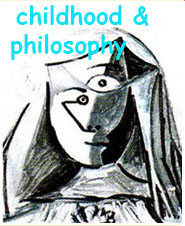to philosophize with children: a work on the excess of words
DOI:
https://doi.org/10.12957/childphilo.2017.26655Abstract
To philosophize with the children and teachers at school is basically to talk to them, to ask ourselves and to explore in a collective way the senses that the world presents or denies us. Otherwise, we could say that the practice of philosophizing implies working with and from language. Foucault invited to consider philosophy as an exercise of self in thought. This exercise implies an exercise of self in language, with language and from language. Language is our way of inhabiting the world. Therefore, working with words is not a mere technical or grammatical exercise. To perceive the words with which we name the world, to explore them, to bring them closer or to separate them from others, to let new combinations be born among them, and so on, allows our world (which for each of us presents itself as "the world") also to exercise and to transform itself, to open itself to new possibilities. Talking is a way of putting our world into practice, of thinking about it. This seemingly simple exercise presupposes more than a technical dexterity or the unfolding of methodologies. It demands a work on the limit of language and implies a permanent work on a certain capacity to perceive what dwells in words and, at the same time, escapes them. Alejandra Pizarnik, Michel Foucault and Pierre Alféri offer clues to explore this dimension of language.Downloads
Published
2017-01-25
How to Cite
olarieta, beatriz fabiana. (2017). to philosophize with children: a work on the excess of words. Childhood & Philosophy, 13(26), 21–34. https://doi.org/10.12957/childphilo.2017.26655
Issue
Section
articles




